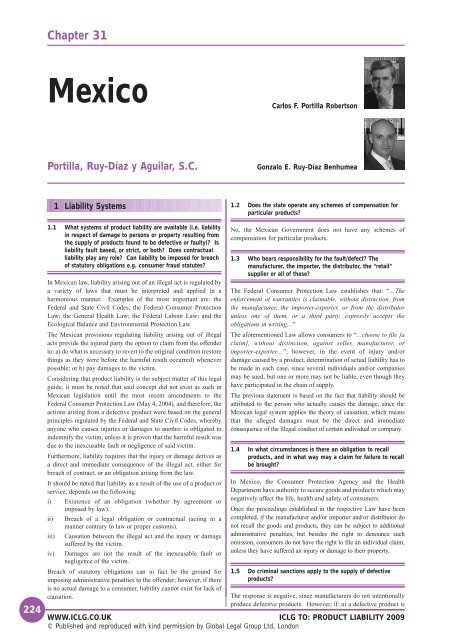Product Liability 2009 - Arnold & Porter LLP
Product Liability 2009 - Arnold & Porter LLP
Product Liability 2009 - Arnold & Porter LLP
You also want an ePaper? Increase the reach of your titles
YUMPU automatically turns print PDFs into web optimized ePapers that Google loves.
224<br />
Chapter 31<br />
Mexico<br />
Portilla, Ruy-Díaz y Aguilar, S.C.<br />
1 <strong>Liability</strong> Systems<br />
1.1 What systems of product liability are available (i.e. liability<br />
in respect of damage to persons or property resulting from<br />
the supply of products found to be defective or faulty)? Is<br />
liability fault based, or strict, or both? Does contractual<br />
liability play any role? Can liability be imposed for breach<br />
of statutory obligations e.g. consumer fraud statutes?<br />
In Mexican law, liability arising out of an illegal act is regulated by<br />
a variety of laws that must be interpreted and applied in a<br />
harmonious manner. Examples of the most important are: the<br />
Federal and State Civil Codes; the Federal Consumer Protection<br />
Law; the General Health Law; the Federal Labour Law; and the<br />
Ecological Balance and Environmental Protection Law.<br />
The Mexican provisions regulating liability arising out of illegal<br />
acts provide the injured party the option to claim from the offender<br />
to: a) do what is necessary to revert to the original condition (restore<br />
things as they were before the harmful result occurred) whenever<br />
possible; or b) pay damages to the victim.<br />
Considering that product liability is the subject matter of this legal<br />
guide, it must be noted that said concept did not exist as such in<br />
Mexican legislation until the most recent amendments to the<br />
Federal Consumer Protection Law (May 4, 2004), and therefore, the<br />
actions arising from a defective product were based on the general<br />
principles regulated by the Federal and State Civil Codes, whereby<br />
anyone who causes injuries or damages to another is obligated to<br />
indemnify the victim, unless it is proven that the harmful result was<br />
due to the inexcusable fault or negligence of said victim.<br />
Furthermore, liability requires that the injury or damage derives as<br />
a direct and immediate consequence of the illegal act, either for<br />
breach of contract, or an obligation arising from the law.<br />
It should be noted that liability as a result of the use of a product or<br />
service, depends on the following:<br />
i) Existence of an obligation (whether by agreement or<br />
imposed by law).<br />
ii) Breach of a legal obligation or contractual (acting in a<br />
manner contrary to law or proper customs).<br />
iii) Causation between the illegal act and the injury or damage<br />
suffered by the victim.<br />
iv) Damages are not the result of the inexcusable fault or<br />
negligence of the victim.<br />
Breach of statutory obligations can in fact be the ground for<br />
imposing administrative penalties to the offender; however, if there<br />
is no actual damage to a consumer, liability cannot exist for lack of<br />
causation.<br />
Carlos F. Portilla Robertson<br />
Gonzalo E. Ruy-Díaz Benhumea<br />
1.2 Does the state operate any schemes of compensation for<br />
particular products?<br />
No, the Mexican Government does not have any schemes of<br />
compensation for particular products.<br />
1.3 Who bears responsibility for the fault/defect? The<br />
manufacturer, the importer, the distributor, the “retail”<br />
supplier or all of these?<br />
The Federal Consumer Protection Law establishes that: “…The<br />
enforcement of warranties is claimable, without distinction, from<br />
the manufacturer, the importer-exporter, or from the distributor<br />
unless one of them, or a third party, expressly accepts the<br />
obligations in writing…”<br />
The aforementioned Law allows consumers to “…choose to file [a<br />
claim], without distinction, against seller, manufacturer, or<br />
importer-exporter…”; however, in the event of injury and/or<br />
damage caused by a product, determination of actual liability has to<br />
be made in each case, since several individuals and/or companies<br />
may be sued, but one or more may not be liable, even though they<br />
have participated in the chain of supply.<br />
The previous statement is based on the fact that liability should be<br />
attributed to the person who actually causes the damage, since the<br />
Mexican legal system applies the theory of causation, which means<br />
that the alleged damages must be the direct and immediate<br />
consequence of the illegal conduct of certain individual or company.<br />
1.4 In what circumstances is there an obligation to recall<br />
products, and in what way may a claim for failure to recall<br />
be brought?<br />
In Mexico, the Consumer Protection Agency and the Health<br />
Department have authority to secure goods and products which may<br />
negatively affect the life, health and safety of consumers.<br />
Once the proceedings established in the respective Law have been<br />
completed, if the manufacturer and/or importer and/or distributor do<br />
not recall the goods and products, they can be subject to additional<br />
administrative penalties, but besides the right to denounce such<br />
omission, consumers do not have the right to file an individual claim,<br />
unless they have suffered an injury or damage to their property.<br />
1.5 Do criminal sanctions apply to the supply of defective<br />
products?<br />
The response is negative, since manufacturers do not intentionally<br />
produce defective products. However, if: a) a defective product is<br />
WWW.ICLG.CO.UK<br />
ICLG TO: PRODUCT LIABILITY <strong>2009</strong><br />
© Published and reproduced with kind permission by Global Legal Group Ltd, London





